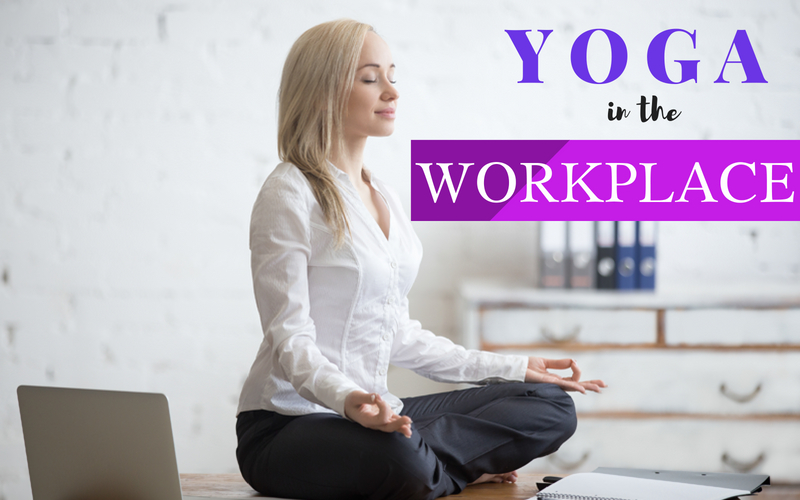When you’re sitting stagnant for long periods of time as a lot of us do while working, it’s even more important to practice yoga. Yoga at workplace is important to ease the stress that is so common from the way we do our work in an office today. Yoga can help areas of the body that are most susceptible to pain and tension while sitting. This includes your lower back, neck, hips, and shoulders.
 You can do yoga at your desk or during your work breaks. Not only does yoga help relieve stiffness but it gets the blood moving so you can become clearer, feel more energetic, and increase productivity. It also reduces tension and combats how stress affects the body and mind. There are habits you may be building at your desk that are causing major issues with your body. These include:
You can do yoga at your desk or during your work breaks. Not only does yoga help relieve stiffness but it gets the blood moving so you can become clearer, feel more energetic, and increase productivity. It also reduces tension and combats how stress affects the body and mind. There are habits you may be building at your desk that are causing major issues with your body. These include:
- Obesity.
- Disorders of the musculoskeletal system.
- Stress.
- Pain in the lower back, shoulders, and neck.
- Carpal tunnel syndrome.
Studies have found that if you have more than four hours of computer time per day, the risk of death is increased by 50%. This is based on whatever illness and health issues occur due to sitting stagnant on a regular basis. There is also evidence that cardiovascular disease risk is increased by 125%. Doing yoga helps you to counteract all of these problems. Moving and stretching at your desk helps you work out the tightness in the body and fights off health issues.
Here are some poses that are specific to sitting at a desk. They can be done in an office quite easily as none of them require a yoga mat or getting on the floor. Do some of the exercises every day and you’ll notice a big difference in how you feel.
Yoga at Workplace for Your Neck and Shoulders:
Eagle Arms:
Working hard allows you to have the luxuries in life but you also risk your health. To make sure you can enjoy all the things you want to in life while working hard, you need to take care of yourself. Your shoulders and upper back take on a lot of stress. Eagle Arms Pose is a great way to really stretch out both.
How to do it:
Sit down at your desk.
Reach your arms out in front of you. They should be straight and parallel to your shoulders.
Bend your left arm so it’s at a 45-degree angle.
Bring the right arm underneath the left.
You want to try to bring your palms together facing inward. This is usually not possible for the first while you start doing this pose because your shoulders are so tight. You can bring the outside of your right forearm to touch the outside of your left forearm to start.
Lift your elbows up and out. Slowly bring the elbows back down. Repeat at least five times and you’ll notice the difference right away. Tension will be reduced in the shoulders, neck, and upper back.
Shoulder Shrugs:
Shoulders really take on a lot of stress when working in an office. They hold a lot of emotional tension as well as the physical repercussions of typing and clicking away all day. There is also the issue of hunching over which causes a lot of stress on muscles in the traps and shoulders. Shoulder shrugs help to alleviate all that tension. You will probably hear many weird crunching noises if you’ve been munching all day.
While sitting at your chair, lift your shoulders to your ears.
Squeeze them as hard as you possibly can, causing tension in the shoulders.
When you release the pose, roll your shoulders down your back.
Do this up to 10 times.
Yoga for the Upper Back:
To focus purely on the upper back, you want to do this upper backstretch. It will get to all the muscles around the shoulder blades, traps, and shoulders.
Sit with your arms straight out.
Your palms should be pressing against each other.
Engage your abs as you bring your chest in and round your back.
You can hold this stretch for up to 30 minutes.
Neck Rolls:
The neck is a very sensitive area and is often taxed while sitting at a desk. This can cause tension which can result in headaches and pain in the neck. Neck rolls are a great way to ease that tension.
https://www.youtube.com/watch?v=yMJcEukHtnA
Sit up in your chair and ensure your feet are grounded at all four corners on the floor.
Slowly and gently, bring your chin to your chest.
Roll your ear to your shoulder.
If you don’t get a good enough stretch, bring your hand to your ear and gently put a little weight on it. If you’re moving your right ear to your right shoulder, you would bring your right arm to your left ear.
Take up to 10 slow breaths on each side to get a wonderful stretch.
Yoga for the Lower Back:
While sitting down all day, the lower back can get sore. This is often due to tight hamstrings or just from slouching. These exercises will help to alleviate back pain, which is one of the most common side effects of sitting at a desk.
Lower-Back Circles:
Stand with your feet as far as your hips.
Do big circles with your torso. Dip your head down towards the ground.
As you begin to come up, gently look up at the sky and arch your back.
Continue doing this clockwise five times and then go counterclockwise five times.
Roll-Downs:
Again, stand with your feet as far as your hips.
Your hands should be by your sides.
Start with your head and round down through the rest of your spine.
As you exhale, release your head forward.
When you inhale, slowly roll your upper body back up, allowing each vertebra to stack on top of each other.
As you stand straight up, make sure you roll your shoulders back and bring your head up last.
Repeat this up to ten times.
Yoga for the Hamstrings:
Standing Forward Bend:
The hamstrings tend to get tight from sitting in a chair all day. This causes problems with your lower back. This is because when hamstrings are tight, they pull on the muscles of the lower back.
Stand with your feet on the floor at a hip-width distance apart. Bend from your hips and bring your chest to your thighs. You can bend your knees if you need to.
Let the head hang.
Stay here for up to 30 seconds breathing deeply into the back of your legs.
Overhead Stretch:
The overhead stretch is simple to do and doesn’t take much time. In fact, many of us do this naturally and you may have noticed that it gives you a little burst of energy.
Raise your arms over your head.
Bring your fingers together and interlock them.
You can even bend side to side to get that side stretch.
Opening Up the Chest Yoga Pose:
Desk jobs will cause you to get tight in the chest because you’re constantly hunching. This pose opens up the chest and helps to ease the tension that has been caused by sitting and typing all day.
Interlace your fingers behind you.
Bring your chin to your chest.
Hold the pose for up to 30 seconds breathing deeply into the tense areas.
Yoga for the Wrists:
For those of you who type all day, you need this pose. We often overlook all the work wrists do but they get just as tense as anywhere else does.
Wrist Circles:
Bring your arms out in front of you and do 10 wrist circles clockwise. Then reverse and do another 10 counter-clockwise.
Wrist Stretch:
Stand up in front of your desk and put your hands down.
Face your palms down with your fingers facing your body.
If it’s not a deep enough stretch, you can lean into the wrists a little.
Hold this pose for up to 30 seconds or until you feel tension relief.
Yoga for the Triceps:
Bring your right arm up behind your back.
Reach the hand to the left shoulder.
Use your left hand to bring your right elbow to your head.
Hold this pose for up to 30 seconds and repeat on the other side.
Yoga for the Thighs:
Your thighs will also suffer tightness so you’ll need to give them a stretch from time to time. It can actually help alleviate pain in the lower back and hips when you do this yoga pose. You are also working on your mobility and balance.
Put one hand on your desk.
Raise your leg up behind you and grab your ankle.
Lift the leg up so your hand sits on the side of the buttock. Your knee should be bent at a right angle.
Hold this pose for 30 seconds to a minute and breathe deeply into your thighs and hip crease.
Slowly release the pose and repeat on the other side.
Yoga for the Hips:
Hips get extremely tight from sitting in a chair all day. It is also where any stress sits and physically manifests. It’s important to do poses that ease hip tension as they are also connected to the hamstrings, upper thighs, and lower back.
Sit in your office chair with your feet flat on the floor.
Lift your leg onto the other leg. Your ankle should sit on the opposite knee.
Sit up straight and slowly bend forward from the hips.
Keep your back straight and your chest open. You’ll feel this stretch in your hips and back.
Hold for up to 30 seconds, release and repeat on the other side.
Sitting Thread the Needle Pose:
Sit up in your office chair with your feet on the floor, all four corners grounded equally. Cross your leg over so the ankle is above the opposite knee.
If you start with your left leg over your right leg, thread your left hand between your legs.
Grab the back of the right thigh.
Pick up your legs with your right hand for an extra stretch.
Hold this pose for 30 seconds to 1 minute, release and repeat on the other side.
Yoga for the Spine:
Seated Spinal Twist:
Spinal exercises are important if you’re sitting for long periods of time. Spine-health can quickly deteriorate from being stagnant so make sure you do some spinal twists a few times a day. It will also help rejuvenate you.
Sit straight and sideways on your chair.
Your feet should be firmly planted on the ground.
Bring your hands to the back of the chair.
Use your arms to twist yourself towards the chair.
Hold for up to 30 seconds, release, and repeat on the other side.
Cat/Cow (Desk Version):
This is another pose that helps the spine stay in good health. This version doesn’t have to be done on the ground which makes it more convenient for the office.
Sit up in a neutral posture.
Put your feet firmly on the ground.
Bring your hands to the top of the knees.
As you inhale, arch your back and look up at the sky.
As you exhale, bring your head to your chest and round your back.
Repeat this up to 10 times.
These poses will prove to be very helpful for all the various issues that can arise from working in an office. The stress of deadlines, the constant sitting, the sugar cravings that happen mid-afternoon, and the general feeling of exhaustion. You don’t have to feel sore, tense, stressed out, or in need of emotional eating. Even if you love your job, you may find it challenging to deal with all the issues that arise from it.
We were probably never meant to sit all day staring at a computer but this is how most of us are making money. Doing daily yoga that targets areas of the body taking the brunt will help alleviate pain. It will also help you to feel more awake and you’ll even experience greater clarity.
Yoga also has the ability to calm down your central nervous system. This helps your overall health. Alternate these yoga exercises during your work week and you’ll notice you have greater flexibility, energy, and productivity.
About Author: This is a Guest Post by Meera Watts who is a yoga teacher, entrepreneur, and mom. Her writing on yoga and holistic health has appeared in Elephant Journal, CureJoy, FunTimesGuide, OMtimes, and others. She’s also the founder and owner of Siddhi Yoga.








































